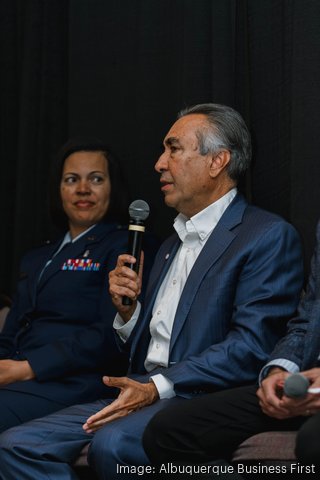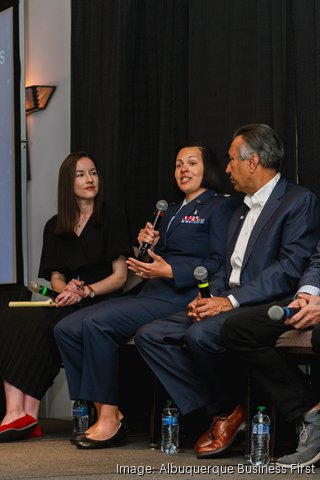Listen to this article 2 min
Physician shortages, gross receipts taxes, medical malpractice insurance — these are just a few of the challenges frequently cited as barriers to delivering quality health care in New Mexico.
And while the health care system in New Mexico often feels overburdened, some of the state’s top providers are doing their part to discover innovative solutions to alleviate hardships. Three of those individuals took part in Albuquerque Business First’s inaugural Health Care Summit and Heroes Awards held April 25.
During a panel discussion that was co-moderated by Meagan Nichols, editor-in-chief of Business First, and Wende Schwingendorf, managing editor of Business First, the panelists both highlighted the problems, as well as how they are each finding creative answers.
The panelists included:
- Dr. Sanjeev Arora, founder, Project Echo
- Dr. Rene Hinton, Lieutenant Colonel/chief of medical staff, Cannon Air Force base
- Dr. Tom Pascuzzi, founder, GoPrivateMD
The following is an excerpt from that discussion, which was edited for brevity and clarity.
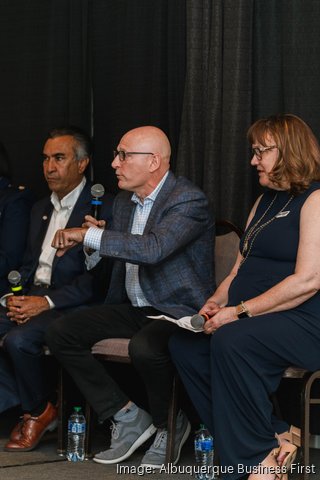
Wende Schwingendorf: Dr. Tom, concierge medicine is a term that you're hearing more and more lately. Can you talk a little bit about when you decided to get into this care model?
Dr. Tom Pascuzzi: Direct primary care is a little different than concierge. Concierge comes with the connotation that only the rich can afford it and they pay you money and you're still using insurance. Direct primary care is 100% capitated. I'm 100% capitated. One fee, all the primary care I can do. … It's a private practice. I have 300 patients, not 3,000. … I learned it from the Air Force. … I decided this concept eight years ago, I said, how am I going to do medicine again, and have autonomy in what I am doing? And I came up with the idea of just going back to the way it was when I was in the Air Force. I took care of the pilots and their wives and their kids.
Meagan Nichols: Dr. Arora, I'd love to hear how you decided to start Project Echo because you grew up, your parents were physicians you saw them, you became a physician. How did you then decide to start something a little innovative and different?
Dr. Sanjeev Arora: I moved to New Mexico in 1993 as the chief of the section of gastroenterology at the University Hospital here. I found something really surprising, that access to specialty care in our state and rural areas was somewhat like developing countries. Poor people really had almost no access to specialty care and being a gastroenterologist, I saw patients in my clinic, and I tried my best for 10 years to provide as much care as possible. But in 2001, I saw a patient in my clinic, and she was 43 years old and in the room with her was a 14-year-old boy and 9-year-old girl. And I asked her, how can I help you? And she said, I have hepatitis C and I want treatment. I said, we will treat you, how long have you had it? And she said, 'I've had it for eight years.' I said, if you've known about it for eight years, why didn’t you come earlier for treatment? And she said, ‘I called your nurse, there was an eight-month wait to see you.’ And now it's eight years, why did you not come? And she said, ‘I live 200 miles away … there were no specialists where I live, and your nurse said I would have to make 12 trips to see you. I'm a single mother, I decided I couldn't take so much time off work, so I didn't come.’ I said, why did you come today? What changed for you? She said, 'I'm having pain here.' … I did an ultrasound and she had hepatocellular cancer in her liver, and she passed away six months later.
I was asking myself, why did she die from a disease that I know how to treat, I live in the U.S., there's medicines and tests available? And the answer I got was she died because the right knowledge didn’t exist at the right place at the right time. And if you don't have the right knowledge, even if the money exists, you can't get the right care. The challenge I was facing was there were 28,000 patients already diagnosed with hepatitis C in New Mexico. That means the Department of Health had their names. This is a reportable disease. Only 1,500 had been treated. I was sort of drowning in work. I asked myself this question, how can I democratize the implementation of my expertise, not democratize my knowledge, which I could easily do on a webinar or something, but multiply myself so that people all over the state could provide care locally? That's why I started the Echo project.
Schwingendorf: Dr. Hinton, those who aren't in the military sphere, may think that medical care on the base is a given. But you have faced some challenges at Cannon, like having to send people about 100 miles away for specialized or emergency care. How does that affect airmen and their families who serve at Cannon?
Dr. Rene Hinton: Like Dr. Tom said, back when he was at Cannon Air Force Base, we had a wide plethora of doctors who had almost every specialty, and that was 30 years ago. Now, we are a small ambulatory clinic. We've got our basic primary care, dental, mental health for our active duty, but we don't have a lot of specialty care access now. That has forced us to be creative, and to make sure that we find ways to take care of our service members and their families. That's really my No. 1 job.
That lack of specialty care affects us in several different ways. We have what's called an Exceptional Family Member Program. We want to make sure that when our military members come to Cannon Air Force Base, that we can give them all of the care that they need. We enroll people, our active-duty members into this program. … We take a look at their packages, and when they apply to Cannon, if we notice we don't have what they need, we have to deny them. … Last year, Cannon had one of the highest denial rates at about 38%. I think the average for Air Force is probably closer to the 10 to 15% denial rate, so that's pretty high. We were the second-highest in the Air Force, and that really hurts our mission.
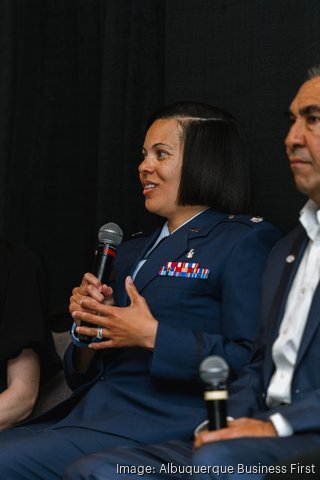
Nichols: Adversity does lead to creativity and innovation. … I would like you to drill down a little bit more and talk about some of the specific ways you are combating the problems that you're seeing.
Hinton: We need to find ways to bring our specialty care back to Cannon. For those of you who don't know, Cannon is in Clovis, New Mexico. And so, we have wonderful rural partners with Plains Regional Medical Center, and also Roosevelt General Hospital, so they've been great, but we have to find ways to bring that specialty care to Cannon. So, we got creative. One of the things that we did was what's called a circuit rider program. That allows us to use other military treatment facilities, their physicians, who have that specialty care, and bring them down to Clovis, have them rotate on a quarterly basis.
Nellis Air Force Base has been fantastic. They've lent us their endocrinologist and also their developmental pediatrician. That's really helped us open up the market for those things. We noticed the top reasons why we were denying families really revolved around behavioral and mental health for children and for adolescents. That's really been a big push for us. JBER (Joint Base Elmendorf-Richardson) in Alaska has lent us their child psychiatrist. … One of the ways that our mission gets degraded by lack of specialty care is because, like Dr. Arora was pointing out, there's not a lot of specialty care in Clovis. We've got to send people to Lubbock, Amarillo, even sometimes Albuquerque. We lose our active duty who are at Cannon for a whole day just for an appointment. Keeping those specialists with us helps us keep those work hours at Cannon Air Force Base. We've also really tried to open up telehealth services.
Nichols: Dr. Arora, you mentioned how you wanted to figure out how to essentially multiply yourself with Project Echo, so talk to us a little bit more specifically about what Project Echo does.
Arora: The first important issue was to find people who were willing to treat hepatitis C all over New Mexico. I drove in my car and found 21 primary care physicians, these were family doctors, nurse practitioners, physician assistants, and I said, are you OK if I teach you how to treat hepatitis C? The first principal of Echo was to use technology to democratize my expertise, so there was no Zoom at that time. We bought a small telecommunications bridge … and people would dial into us. … The secondary idea was to share best practices. I went around the state and gave my protocol to these doctors in rural areas and said, this is how you treat it, I’m going to teach you. This is called sharing best practices. But they said, ‘This is chemotherapy, we're not supposed to be doing this. We can't do this.’ I asked myself, how did you become an expert in treating hepatitis C? And when I did my fellowship in Boston, in Massachusetts, I would see a patient present to my professor, see another one present to my professor. And after two years, they said, ‘Aha, you're a gastroenterologist now.’ I said, OK, I'm going to use this model to create new hepatitis C ologists in New Mexico. Not gastroenterologist, hepatitis C ologists, and I will use the model of case-based learning, guided practice, all teach, all learn. …
In 2003, I launched my first Echo, where all 21 joined, like Hollywood Squares, and basically, first Gina will present the patient, then Ryan will present the patient and then David will present a patient — from all over the state — to each other. We would always do it on a Wednesday afternoon at 3 p.m. And we would discuss about eight patients without their names or identifiers. And then 15 minutes, I'll give them a lecture on hepatitis C or my colleague, psychiatrists would get them a lecture on some aspect of mental health. … I did this week, after week. What I found in one year, they became great experts. In 18 months, the wait in my clinic had gone down to two weeks. And now even today, anyone in New Mexico can get hepatitis C treatment locally within two weeks close to their home. This led me to realize that there was a possibility to multiply myself. … We were creating contextually relevant information for them based on their local circumstances. … We have 5.8 million learners in 205 countries and areas … all 193 UN members. And we have impacted the health of close to 300 million people.
Schwingendorf: If you could change one thing about the health care system in New Mexico today, what would that be?
Hinton: Malpractice insurance.
Schwingendorf: What challenges has that caused?
Hinton: It indirectly affects the Air Force Base. Our rural partners struggle to find physicians, they struggle to keep their doors open, especially our smaller partner, Roosevelt General Hospital. … That affects us because that means we have lack of access to care.
Arora: I do not see any other solution over the next 10 to 15 years, other than upskilling the existing workforce that resides in the rural areas, to put in effective triage systems. We make sure that they are highly competent in the most common diseases so they can provide care close to home. Decongest our specialty hospitals, Presbyterian Hospital or University Hospital and provide the right care at the right place at the right time. … One can think of telemedicine as a solution, but the problem is this specialty shortage is not just in the rural area. It's also in the urban area. … That I believe is a potential solution until we can actually come up with stronger solutions to improve medical school enrollment, to increase specialty residencies to encourage more people to go into medicine, because we don't have that workforce to care for our people right now. And it's a huge challenge. Many, many excess deaths are occurring in the United States. Our school children’s suicide rate is one of the highest in the country. Our overdose addiction deaths are one of the highest in the country. It doesn't have to be that way.
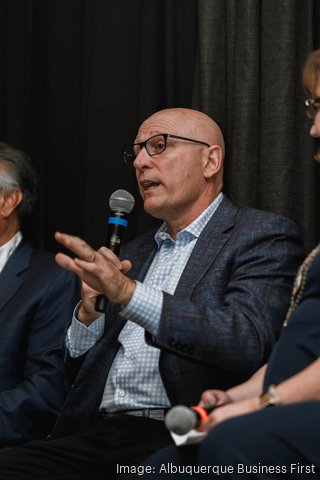
Pascuzzi: The value equation is quality over cost. You'll pay a lot more for something that you think is high quality. Quality over cost. In health care it is access. … The question was asked, what can we do? Get rid of the gross receipts tax in health care. It's killing me. It's ridiculous. … For 30 years I’ve been paying this making a good salary as a doctor. That's millions of dollars. … We need private medicine, and we need doctors practicing private medicine. … Its primary care, 98% of this doesn't need to go to a specialist. My patients don’t go to a specialist. If they are convinced that they can trust me, we can take care of it in the office. We really can. We keep the referral rate as low as possible. That's what we do in good primary care. You can't do that seeing four people an hour or three people in an hour. I see one an hour. … And there's a lot of doctors, colleagues of mine, friends of mine, we're the rapidly growing baby boomer group, and we're going to quit practicing medicine. That's going to be the big problem. You can't train them fast enough; you can't get the mid-levels up to speed to take care of patients the way we do as doctors. You're creating a situation where the specialists are going to be in higher demand. Your best trained doctors are guys who have been in practice for 20 years. Ask anyone, 14 to 20, they're good. … Telemedicine and access to specialists is a problem. When I step back, I think it's primary care. I blew up my emergency medicine practice, and I built urgent cares. I blew up my urgent care practice, I went into 100% capitated primary care. It's been a great career. It’s fun and it's the most rewarding it's ever been, and the patients are happier. It is a smaller group. … Human psychology, you cannot remember anything about more than 100 people. It's challenging at 300, trust me. At 100 you can know their name and their family. All this comes into play in how we deliver care. … Relationships is what it's about.
Nichols: What is the biggest thing that you want this audience to take away from this conversation?
Arora: I think all of us in the business community have an extreme vested interest in improving health care. Because if you do not have good health care here, we cannot attract good businesses here. We cannot have a good education system for our children because children who don't have good health, or good mental health, specifically, they cannot study. … I do agree with Tom that concierge medicine will provide really good care for small groups of people because of the extraordinary attention. But one thought I'd like you to consider, today in New Mexico … 40% don't even have a primary care doctor. … If I were to reduce the panel size of a primary care doctor from 1,500, to 300, what happens to the other 95% of people in New Mexico, who have no doctor?
Pascuzzi: It’s not a decrease, it is an add on. I would have stopped practicing seven years ago; I made my living. I sold my businesses. I've been there. Doctors are stopping practicing. I don't mean to interrupt, but I wouldn't be seeing [these] 300, 400 people. They wouldn't have any access and it spreads from there because I take care of businesses. I take care of a whole bunch of employees. I think we have an opportunity.
Arora: My suggestion is expand the scope of practice of our health care workforce. … This is not a turf battle. I want every person in health care from community health workers to nurses, nurse practitioners, physician assistants, to work at the very top of their license and provide the right care the first time around. And they can do that, if they are mentored in all teach, all learn platforms and supported. But if you leave them on their own, they burn out, they have less resiliency. … I'm not against concierge medicine, if there are not primary care doctors. But what I don't want is only the rich to get good primary care. That doesn't work for me. I want everyone to get good care.
Hinton: My big takeaway would be building partnerships. Everybody has a vast knowledge in different things. … The more that we can get together and share our ideas, and make our voices heard, the more that we can change health care in New Mexico, and just around the country and building those partnerships. … We had a health care summit back in September. We had representatives from the governor from the Senate from all around our state and from D.C. and so just a wide variety of people that really helped us get to how can we increase the care for our community? If we can do that on a reproducible, large scale and build partnerships, and get all of these fantastic ideas that will really help.
Pascuzzi: Whatever your career is, look for something that gives you the autonomy to do what you love to do, that’s hard to say. You may not be a private businessperson, you may have to have the right boss, right? Become the master of what you can control. … Then, really have a purpose in what you're doing. I think how we go about that in health care, there's been different ways. I've [gone] from 90 patients a day in an ER to 60 to 35 a day in primary care up to five or six a day. I think there's many ways that we can deliver care. I found one that works really well for me and my patients.
